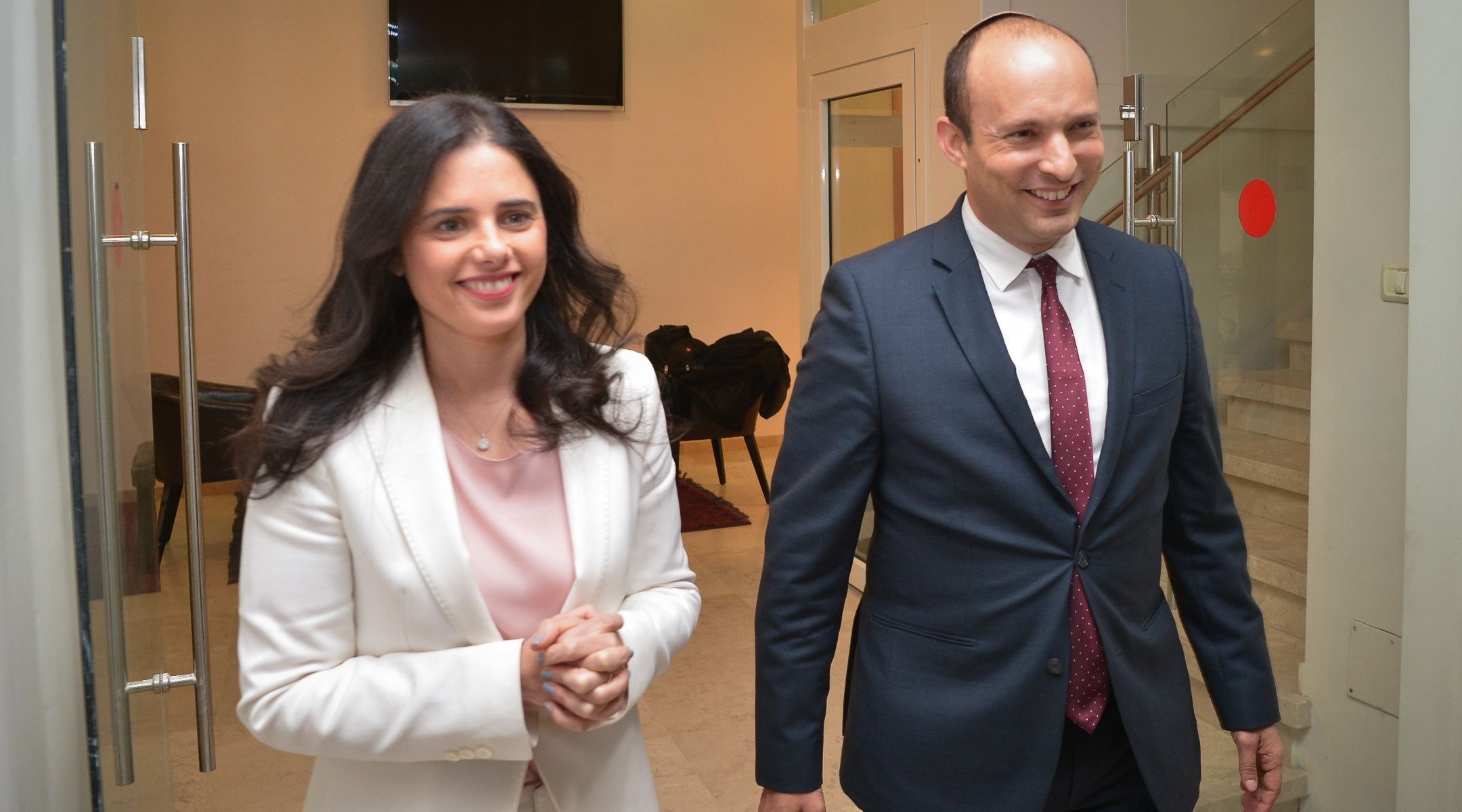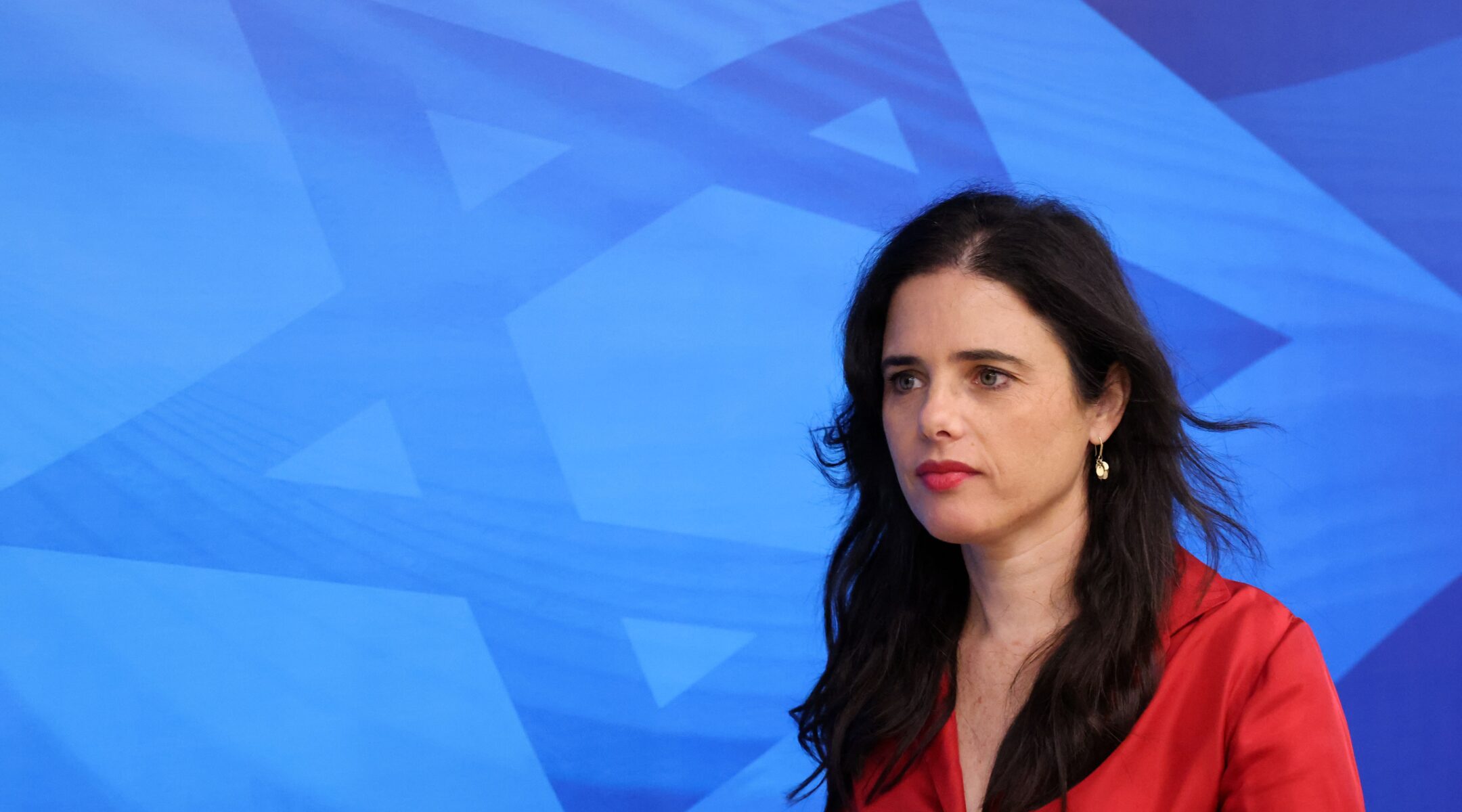TEL AVIV (JTA) — From being named most influential woman in Israel by Forbes to drawing Adolf Hitler comparisons by Turkey’s Recep Tayyip Erdogan, Ayelet Shaked has seen it all during her intense 10 years in Israeli politics.
For almost all of that time, Shaked was seen as the perpetually rising star of the right wing, mentioned on every shortlist of potential future prime ministers. Now, she is facing down an election in which polls predict that her party, Jewish Home, will be wiped out completely, not even making the threshold to hold onto a handful of seats in Israel’s parliament.
In a last-ditch attempt to turn the tides, Shaked is now pleading for forgiveness from her supporters and from the “community I love, whose heart was broken” after she teamed up with an Arab Islamist party and left-wing and centrist parties last year to topple Benjamin Netanyahu and crown Naftali Bennett and Yair Lapid as leaders of the Jewish state.
Shaked’s political zigzagging, coupled with her determination to challenge Netanyahu’s reign over the right-wing bloc, seem poised to put an end to one of the most original experiments the Israeli political system has seen in years: an attempt by a young, secular woman to replace the religious, male-dominated leadership of the nation’s pro-settlement, nationalistic wing that has been a prominent force in Israeli governments for the past four decades.
After relentless attacks in Knesset by her former allies on the right, Shaked defended her decision to join Bennett’s experimental coalition.
“Only when I saw there was no other option to form any other government, and that the alternative was either a fifth election or the current government, I was persuaded,” she told Israel Hayom. “And I stand by my choice. This is not an easy or simple government and everyone is making concessions. But it was right to form it and not go to elections.”
In the volatile world of Israeli politics, Shaked cannot be counted out until all votes are tallied, and even then she could return in a future election — one that could happen quickly, given the continued stalemate predicted after this election, the fifth in three years. Netanyahu, seeing that Shaked could be a useful ally in forming a coalition, reportedly has expressed regret for sidelining her. But for many of Shaked’s supporters, at least for now, the politician who had once been a sign of generational change and rejuvenation has become synonymous with opportunistic betrayal.
RELATED: A 5th Israeli election in 3 years? Here’s how we got here and what happens next.
Natain Feigin from the central Israeli city of Modiin recalled being inspired after hearing Shaked speak at a memorial service for a former party leader. “She had tears in her eyes,” he said. “I was moved to discover a genuine politician and I was sure that she had potential to be another Indira Gandhi, Golda Meir or Margaret Thatcher.”
But he was dismayed by Shaked’s decision to join the anti-Netanyahu coalition last year, citing it as the main reason for abandoning her in the upcoming election.
“Whatever her reasons for her political flick flack, I relate to her now as I do to all the politicians,” Feigin told the Jewish Telegraphic Agency, using a Hebrew term for an acrobatic flip. “I’m very disappointed. In my eyes she was more sincere and had more genuine values.”
Feigin is far from being alone in his view. A recent poll by Israel’s Channel 13 found that 58% think Shaked should retire from politics, while only 17% said she should run.
Shaked did not reply to requests for comment from JTA. But her allies in her party say they haven’t given up on the chance for forgiveness.
“Ayelet Shaked has a proven track record as one of the most effective right-wing policymakers over the last decade and there are many potential voters looking for her to continue her work in the next Knesset,” Jeremy Saltan, a candidate on the Jewish Home party’s list for Knesset, told JTA. Shaked, he added, “has promoted right-wing policy in every government she has been a part of, including this one.”
Shaked’s political career was shaped, for better or worse, by Netanyahu. She started off as his office director from 2006 to 2008, then broke with him and moved further to the right by joining Naftali Bennett’s religious Zionist Jewish Home party in 2012, becoming its only female secular member. The following year, at the age of 36, Shaked became a household name when she was elected as member of Knesset for the party.
Just two years later, Shaked was appointed justice minister in the new Netanyahu government that followed the 2015 elections — a remarkable position for a relative novice. It was during this period she left a huge mark on Israeli society, gaining popularity among right-wing voters for her support for expanding Jewish settlements in the West Bank while making enemies in Netanyahu’s Likud party.
Not unlike followers of Donald Trump in the United States and conservative Americans, Shaked believes that the key to shifting power toward the right is reshaping the judiciary, which, she argued, has been skewed toward the liberal side. Shaked became known for her attacks on Israel’s Supreme Court, which she called “the most powerful political actor.”
“Her claim to fame was the justice ministry, where she was quite successful. She was leading a very strong line against the courts, adding conservative judges. She was also quite brutal when it came to refugees and non-Jewish residents in Israel,” said Gideon Rahat, chair of the political science department at Ben-Gurion University. “In terms of ideology she was doing her best and doing it quite well.”
While her “judiciary revolution” didn’t see all its goals accomplished, such as breaking up the Supreme Court’s judicial oversight of the Knesset, Shaked appointed over 300 conservative judges and presided over six appointments of Supreme Court judges, leaving her mark on the judiciary system for years to come.
“One year ago I decided to change the face of the Supreme Court with the appointment of four justices. Today that ends with the appointment of another two,” Shaked said in 2018 after the judicial selection committee appointed two of her candidates to the Supreme Court. “They are part of a process of returning the court to its basic function: interpreting the norms that parliament decides, not replacing it.”

Naftali Bennett and Shaked are shown after their announcement on Dec. 29, 2018, in Tel Aviv that they would form a new Orthodox-secular right-wing party. (Yossi Zeliger/Flash90)
Her election campaign in 2019 — “Shaked will defeat the High Court of Justice” — was lauded by right-wingers and widely criticized by the opposition for being anti-democratic and dangerous. But while she easily preserved her place in government, other forces were working against her.
“On the one hand she’s talented. In 10 years she did what a lot of politicians wouldn’t be able to do in 50 years,” said Rahat, who is a senior fellow at the Israel Democracy Institute, a leading nonpartisan political think tank. “But on the other hand there were two obstacles she couldn’t pass, namely Netanyahu’s monopoly on the right and her identity politics (secular, right-wing woman from Tel Aviv) that really didn’t work for her.”
As Shaked’s star rose, the rift between her and Netanyahu deepened, and according to Israeli press reports, Netanyahu’s wife Sara ultimately ruled that “Shaked won’t be in the Likud. Period.”
In an interview with JTA, Netanyahu’s former media advisor, Aviv Bushinsky, called Shaked “the most tragic story” of Israeli politics today.
“She was a very strong figure, especially as a woman, and could have been a leader of Likud, if only she had made the right decisions,” he said.
One of her main mistakes, according to Bushinsky, was being “too loyal” to Bennett, whom she supported until the latter became prime minister, only to retire from politics a year later when his government collapsed in June this year.
Since then, Shaked has struggled to convince her voters, as well as the right-wing bloc supporting Netanyahu, that “she returned to the right,” as she put it last week.
On Sept. 27, Shaked tweeted her reaction to the Italian elections, in which Giorgia Meloni, a right-wing, anti-immigration, anti-LGBTQ politician was elected presumptive prime minister.
“Congratulations to the new prime minister of Italy, Giorgia Meloni. Just like the right-wing won in Italy it also wins in Israel, and it proves that a woman can do it all,” Shaked tweeted.
But it may be too late for the Israeli right-wing’s forgiveness. Elections are around the corner, and voters don’t seem inclined to give Shaked a second chance. A poll released Sunday shows her polling well below the 3.5% vote threshold needed to enter the government, not much higher than the cost-of-living-focused party led by a 20-year-old TikTok star, Hadar Muchtar, who is too young to be elected.
“I don’t think asking for forgiveness will help her, but she doesn’t have anything to lose. If a day before the election the polls show she’s still hovering around 2%, she will give up, mainly to save her name and not to be the one responsible for wasting votes for the right-wing,” Bushinsky said.
Shaked’s last hope for political survival appears to rest once again with Netanyahu. If the election is close and Shaked emerges as Netanyahu’s spoiler, by costing the right wing bloc a decent amount of votes (since in Israel, votes that go to a party that does not pass the threshold are not taken into account), he might offer her a last-minute deal.
“Netanyahu is very instrumental in his politics,” said Bushinsky. “If Shaked can deliver a majority for him, all personal animosity will be forgotten and she will be a star.”
JTA has documented Jewish history in real-time for over a century. Keep our journalism strong by joining us in supporting independent, award-winning reporting.






